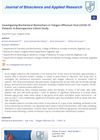 September 2024 in “Journal of Bioscience and Applied Research/Journal of Bioscience and Applied Research ”
September 2024 in “Journal of Bioscience and Applied Research/Journal of Bioscience and Applied Research ” COVID-19 can cause hair loss due to stress, with inflammation markers like D-dimer levels playing a role.
Hair can naturally regain color after greying, and this change may be linked to stress levels.
Hair can naturally regain color, and stress might influence greying and its reversal.
 1 citations,
January 2019 in “Turk Dermatoloji Dergisi”
1 citations,
January 2019 in “Turk Dermatoloji Dergisi” Oxidative stress is likely important in causing telogen effluvium, and antioxidants might help treat it.
 438 citations,
October 2010 in “Oncogene”
438 citations,
October 2010 in “Oncogene” Keratins help protect cells, aid in cancer diagnosis, and influence cancer behavior and treatment.
 11 citations,
November 2015 in “Journal of Functional Foods”
11 citations,
November 2015 in “Journal of Functional Foods” Hibiscus petals improved blood sugar and stress responses in diabetic rats.

Ganoderma lucidum extract may help treat stress-related hair loss.
 February 2024 in “Scientific reports”
February 2024 in “Scientific reports” Four genes are potential markers for hair loss condition alopecia areata, linked to a specific type of cell death.
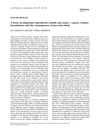 February 2010 in “Acta Obstetricia et Gynecologica Scandinavica”
February 2010 in “Acta Obstetricia et Gynecologica Scandinavica” The issue covers reproductive health topics like cancer markers, incontinence treatments, and the impact of pre-term birth.
 2 citations,
September 2022 in “Actas dermo-sifiliográficas/Actas dermo-sifiliográficas”
2 citations,
September 2022 in “Actas dermo-sifiliográficas/Actas dermo-sifiliográficas” For sensitive scalp, treatment is personalized and may include specific medications and hydration, while avoiding stress and irritating products.
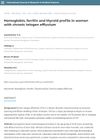 January 2016 in “International Journal of Research in Medical Sciences”
January 2016 in “International Journal of Research in Medical Sciences” Low iron, low thyroid function, and stress are linked to excessive hair shedding in women.
 December 2022 in “Türk biyokimya dergisi”
December 2022 in “Türk biyokimya dergisi” The conclusions are: fecal short-chain fatty acids may help prevent cancer, fiber intake can reduce obesity, weight loss is hard for obese people, low BMI cancer patients are more prone to chemotherapy side effects, intermittent fasting benefits gut health, cherry laurel has health benefits in rats, certain gene variations can increase stress in hair loss patients, fecal acids can affect blood sugar levels, cold agglutinin can affect blood test results in autoimmune patients, and people with Crohn's disease have higher levels of a certain chemical in their blood.
 August 2022 in “Gene Reports”
August 2022 in “Gene Reports” New hair loss treatments could be improved by using combined biological markers.
 2 citations,
February 2014 in “Hair therapy & transplantation”
2 citations,
February 2014 in “Hair therapy & transplantation” Alopecia Areata is an autoimmune condition causing hair loss, influenced by genetics, environment, and possibly improved by anti-MIF therapy, with many patients experiencing regrowth within a year.
75 citations,
February 2017 in “Aging” SkQ1 antioxidant improved health and lifespan in mice.
 3 citations,
January 2023 in “Dermatology Practical & Conceptual”
3 citations,
January 2023 in “Dermatology Practical & Conceptual” IMA and IMA/albumin levels don't predict alopecia areata severity.
3 citations,
January 2021 in “Oxidative Medicine and Cellular Longevity” Nrf-2-modified stem cells from hair follicles significantly improve ulcerative colitis in rats.
 3 citations,
January 2017 in “Yonsei Medical Journal”
3 citations,
January 2017 in “Yonsei Medical Journal” Blocking 11β-HSD1 can lessen the harmful effects of glucocorticoids on hair growth cells.
22 citations,
April 2022 in “Stem cell research & therapy” Hair follicle-derived extracellular vesicles may help heal chronic wounds as effectively as those from adipose tissue.
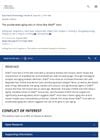 1 citations,
July 2022 in “Experimental dermatology”
1 citations,
July 2022 in “Experimental dermatology” The SHJH hr mice with a mutated Hr gene show signs of faster skin aging due to poor antioxidative protection.
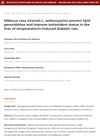 1 citations,
October 2021 in “Bioactive compounds in health and disease”
1 citations,
October 2021 in “Bioactive compounds in health and disease” Hibiscus anthocyanins help protect the liver and improve antioxidants in diabetic rats.
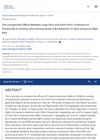 October 2024 in “Journal of Neuroscience Research”
October 2024 in “Journal of Neuroscience Research” Long-term Finasteride treatment reduces depression better than short-term treatment in rats.
 January 2019 in “Advances in stem cells and their niches”
January 2019 in “Advances in stem cells and their niches” Skin health and repair depend on the signals between skin stem cells and their surrounding cells.
 20 citations,
November 2019 in “International Journal of Environmental Research and Public Health”
20 citations,
November 2019 in “International Journal of Environmental Research and Public Health” Breathing in high levels of certain air pollutants significantly increases women's risk of developing Polycystic Ovary Syndrome.
 January 2015 in “Springer eBooks”
January 2015 in “Springer eBooks” Hair health is influenced by genetics, aging, and environmental factors, with proper care needed to maintain it.
 August 2022 in “The journal of investigative dermatology/Journal of investigative dermatology”
August 2022 in “The journal of investigative dermatology/Journal of investigative dermatology” Increasing type 17 collagen reduces aging signs in skin cells caused by UV light.
 July 2024 in “International Journal of Molecular Sciences”
July 2024 in “International Journal of Molecular Sciences” Hemp seed biomaterials may reduce hair loss and improve hair growth.
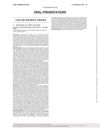 September 2019 in “Rheumatology advances in practice”
September 2019 in “Rheumatology advances in practice” Diagnosing and treating rapidly worsening lung disease is difficult and requires better guidelines and understanding.

Early-onset baldness is linked to genetics, lifestyle, and can indicate higher risk for heart and metabolic diseases, and affects mental health.
 194 citations,
March 2003 in “American Journal of Pathology”
194 citations,
March 2003 in “American Journal of Pathology” Stress stops hair growth in mice by causing early hair growth phase end and harmful inflammation through a specific nerve-related pathway.

























